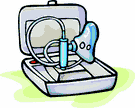 Musicians who play this high-resistance woodwind instrument appear less likely to develop obstructive sleep apnea, according to this study reported during the meeting of the Associated Professional Sleep Societies by researchers from the University of Houston-Clear Lake, in Texas.
Musicians who play this high-resistance woodwind instrument appear less likely to develop obstructive sleep apnea, according to this study reported during the meeting of the Associated Professional Sleep Societies by researchers from the University of Houston-Clear Lake, in Texas.
First, the details.
- 901 professional musicians were surveyed.
And, the results.
- Overall, 5% of musicians reported an obstructive sleep apnea diagnosis
- 29% were at high risk for it.
- There was no statistically significant difference between instrumentalists and noninstrumentalists — conductors and singers.
- The risk of apnea according to instrument type was significantly higher for those who played high-resistance woodwinds vs noninstrumentalists and for other instrumentalists.
- High-resistance woodwind instruments are those in the double-reed category — oboes, English horns, and bassoons.
The bottom line?
It’s possible that the mouthpiece used in double-reed instrument has “characteristics that would help sleep apnea patients,” speculated Dr. Dennis Nicholson from Pomona Valley Hospital, in California.
Maybe, but researchers from Switzerland report, “Regular didgeridoo playing [high resistance but definitely not a double reed woodwind] is an effective treatment alternative well accepted by patients with moderate obstructive sleep apnea syndrome.”
6/28/09 18:53 JR